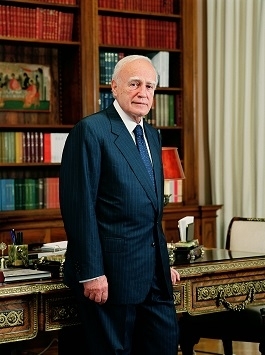Greek president says post-crisis reforms offer opportunities for Korean investors
 |
|
Greek President Karolos Papoulias |
Ahead of talks in Seoul with President Park Geun-hye, Greek President Karolos Papoulias said “regional peace and security” are central, because in Europe and Asia “there is political uncertainty and rising tension.”
Papoulias arrived Monday for four days of meetings expected to also center on expanding bilateral cooperation across the spectrum of two-way ties, including trade and investment, shipbuilding and shipping, infrastructure, defense and tourism.
But his visit also comes at a time of territorial conflicts between China, South Korea and Japan, perennial North Korean nuclear threats and, in Europe, continuing financial turmoil.
“Your country plays a prominent role in international affairs. You have actively participated in U.N. peacekeeping operations and joined efforts to strengthen the disarmament and non-proliferation regimes,” Papoulias said in an exclusive interview with The Korea Herald by email before arriving in Seoul.
Papoulias had previously visited South Korea as his nation’s foreign minister in the late 1980s, but this trip marks the first trip ever for a Greek president. The visit could not happen at a more important time for bilateral relations, too, as Greece assumes the presidency of the European Union in January 2014.
South Korea and the European Union upgraded their relationship to “strategic partnership” status and East Asia’s third-largest economy signed an FTA with the EU that went into force in July 2011.
“During our presidency we will work in close cooperation with your government to further promote and enhance political and economic ties between the European Union and South Korea,” he said.
The 84-year-old statesman has spent a lifetime in politics. When the Nazis invaded and occupied Greece during World War II, Papoulias was among the first to join the armed resistance against the invading forces.
Later, he became a close associate of Andreas Papandreou, a seminal figure in Greek politics, and a founding member of the Panhellenic Socialist Movement (PASOK), which dominated from 1981 until the current financial crisis.
Papoulias said an issue of concern for Greece ― which is also a point of bitter contention with neighbor Turkey ― is the Mediterranean island of Cyprus. “As the Korean Peninsula is home to a divided nation-state so is Cyprus, the last divided country in Europe.”
During the summit, Park is expected to seek Greece’s support for her regional peace initiative, the so-called Trustpolitik policy. Cheong Wa Dae announced that Park will also express gratitude to Papoulias for the support Greece provided during the Korea War.
“Our relationship is solid as it was forged through a history of shared sacrifice. I look forward to visiting the monument of Incheon honoring Greeks who died in this cause but also the national cemetery to honor the Korean dead,” he said.
This year marks here the 60th anniversary of the end of fighting in the three-year conflict against China and North Korea, which ended in 1953 not with a peace treaty but with an armistice, although South Korea refused to sign it.
Greece dispatched a battalion of 840 infantrymen and one transport plane squadron. The battalion was attached to the 7th Cavalry Regiment of the 1st U.S. Cavalry Division. More than 180 Greeks died in the fighting and about 460 were injured.
“We also support efforts that will lead to durable peace on the Korean Peninsula and peaceful reunification. Through cooperation, exchanges but also with resolve to establish durable peace. In your efforts you will find, once again, Greece a staunch ally and friend,” he added.
In addition to regional security and commemorating Greek support during the Korean War, financial and trade issues will play prominently in talks with the President Park.
Greece still reels from the devastation wrought by the sovereign debt crisis that began in October 2008. Five years on, unemployment in Greece remains at a staggering 27 percent.
The European bailout program that began in 2010 conditioned financial help on austerity measures and dramatic restructuring.
“Greece is introducing a wide range of structural, fiscal and business sector reforms. Of particular importance is the ‘fast track’ process for strategic investments. There is also a privatization program that aims to attract private know-how and capital into a wide range of sectors of the Greek economy,” the president said. “These are important developments and give Korean investors a wide range of investment opportunities.”
“Financial flows and trade between our countries is uneven. Greek ship-owners are the best clients of the Korean shipbuilding industry. Trade is doing well but we can do much better,” he said.
Greek-South Korean bilateral trade amounted to $2.14 billion in 2012. South Korea and Greece forged diplomatic relations in 1961. “The time to forge partnerships is now, while the Greek economy is starting to recover from the difficulties of the last few years,” he added.
By Philip Iglauer (ephilip2011@heraldcorp.com)